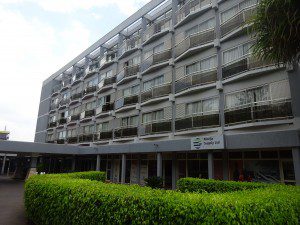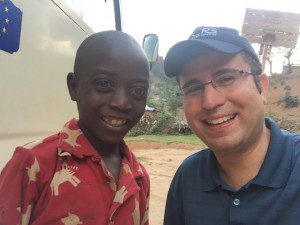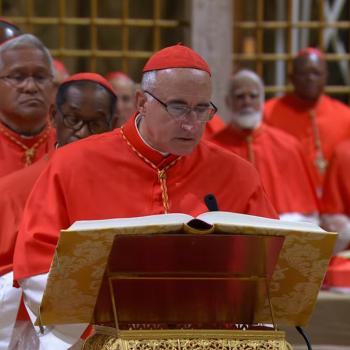On April 6th, 1994, the airplane carrying the Rwandan president Juvenal Habyarimana was shot down seconds before landing in Kigali. Absolute chaos descended upon the central African country of Rwanda for the next one hundred days as almost one million people were massacred. The genocide was perpetuated by members of the Hutu majority tribe against the Tutsi minority. Decades of vitriolic speech, systematic discrimination, and occasional violence erupted into an unimaginable disaster. Corpses bearing signs of rape and machetes littered the countryside. The international community evacuated and took no action to stop the massacre. The genocide ended when the Tutsi-led Rwandan Patriotic Front took control of the country, and genocide perpetrators fled into neighboring countries.
The chilly morning I met Bishop Emeritus Alexis Habiyambere of Nyundo, Rwanda, at his house on the shores of Lake Kivu, I asked him what is the one thing the Catholic Church in Rwanda can contribute to the universal Church. I hoped he would speak about the genocide, and I was not disappointed. “We lived difficult moments in Rwanda with the genocide,” he began. “In 1994, we believed that the Catholic Church was finished. The faithful left, people believed that the Church was responsible for [the genocide]. We believed that the Catholic Church in Rwanda was truly at zero.”
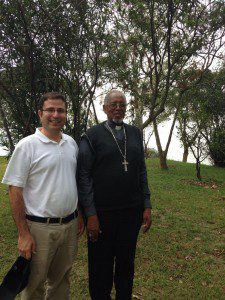
As terror filled every corner of the country, many sought refuge in churches. As a Christian country with a Catholic majority, most of these churches were Catholic. Hutu militias did not respect these sacred spaces, systematically killing thousands within their walls. Both the killers and victims were Christian, whether Catholic or Protestant. Scandalously, some priests, nuns, and pastors were involved in the genocide either actively or passively. Critics point out that the Catholic Church did not condemn the deplorable violence. Despite instances of clergy involved in the genocide, most stood helpless as their parishioners were brutally killed. Ethnic identification overpowered the bonds of both faith and family.
Bishop Habiyambere, now an old man whose simple presence demands respect and admiration, became bishop of Nyundo by the Congolese border in 1997 when violence still ravaged the border of the two countries. During his nineteen years as bishop, he oversaw the rebuilding of the Rwandan Church primarily by heading the development of the church’s ten year master plan, and by continuously calling for peace and reconciliation. In October 1997, he denounced “so-called Christians who cannot live together with persons of a different ethnicity.” As he continued answering my question, he observed, “I believe that we have seen that the Holy Spirit, which guides the Church, gave us hope and courage. You should not be discouraged. Our Church is the Church of Jesus Christ, guided by the Holy Spirit. During difficult moments, we must not grow discouraged. We must believe.” Reflecting on challenges faced by the Church in the United States today he reminded the group of us that, “we must trust the Holy Spirit and the Virgin Mary. Do not be discouraged, you are accompanied by the Holy Spirit and the Virgin Mary in your journey.”
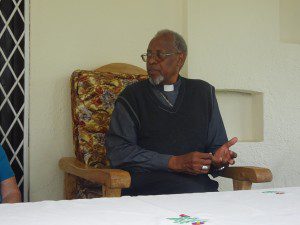
The Catholic Church has struggled and continues to struggle as an agent of reconciliation in Rwanda. Soon after the genocide, in 1998, Catholic Relief Services partnered with the Catholic Church to create a national Peace and Justice Commission to focus on reconciliation. Father Vincent, the present head of the Peace and Justice Commission explained that much has been accomplished, but work is still needed. Father Jean de Dieu, Secretary of the Rwandan Bishop’s Conference, expressed that what happened in 1994 cannot go away in just twenty years. Grateful to CRS for providing food to Rwandans when he was a child, he recognizes that there is a continued need to witness to the Gospel with an understanding of the history of the country. Along with the challenges of poor education, new ideologies, and a need for financial independence, the Catholic Church of Rwanda still has a long road ahead of it.
As needs of the Church have evolved, so has the kind of assistance provided by CRS. In 2010, at the request of the Bishop of Cyangugu, CRS partnered with the diocese to create an institutional strengthening program to professionalize the services and resources of the diocese. The leader of the project, Mr. Innocent Nzabagerageza, explained that the initial evaluation conducted revealed that the diocese and parishes lacked financial accountability. There were no budgets, no financial records, no inventory of assets, no employee contracts, no minimum wages, no human resources department, no transparency in paying employees, and no oversight over financial decisions taken by the pastor.
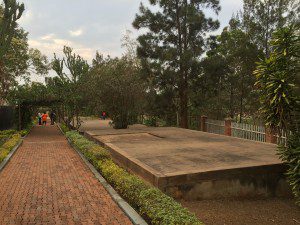
After years of evaluation and standardization, benefits enjoyed by the Diocese of Cyangugu include the centralization of finances, the authorization of expenses, the creation of a diocesan human resources office, the improved management of properties, the better use of employee talents, the implementation of standards, the training of employees, and the implementation of internal controls. The ultimate goal is that the diocese along with its parishes will be financially self-sufficient through better management and income generating activities.
The Institutional Strengthening Program, funded entirely by generous benefactors of CRS, has transformed the Diocese of Cyangugu into a school for other dioceses in Rwanda and the region. At least nine dioceses have visited Cyangugu hoping to duplicate this program in their own local churches. At this time, CRS cannot fund the implementation of the project in other dioceses, but it has empowered the Diocese of Cyangugu to teach others.
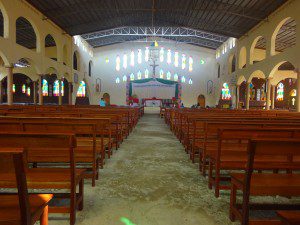
The work of CRS allows the Church to focus on its mission while being strengthened as an institution. Bishop Bimenyimana of Cyangugu stated that “management is not our mission, but pastoral work. We need to be transparent and accountable towards the people and toward ourselves.” Through this project CRS assists in the transformation of lives as profound institutional change within the Church is achieved. CRS provides expertise and funding to partners such as the Diocese of Cyangugu so that partners may develop and run programs suited to meet their needs. Successful programs such as this one in Rwanda can be duplicated throughout the world, increasing the good fruit brought about through the generosity of CRS benefactors.
Out of the chaos of the genocide, the Catholic Church in Rwanda is emerging as an institution that is organized, strong, and transparent, ready to meet the present challenges of preaching the Gospel. The hope expressed by Bishop Alexis Habiyambere which guided the Church out of the darkness of genocide continues to be present in Rwanda as faithful Catholics look to the future. Hope is the gift the Rwandan Church offers the universal Church. The goodness of generous hearts is transforming lives and communities as the Gospel is made incarnate through the continuous outreach of CRS made in the name of Christ and his Church.
*Just a few days ago, the Catholic Bishops of Rwanda issued an apology for the role of the Catholic Church in the genocide. Read it here.
